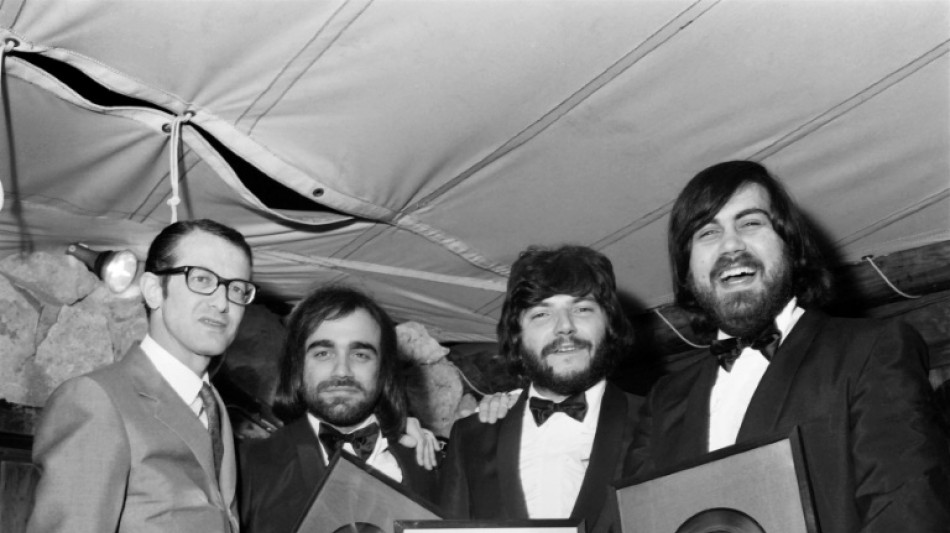

'Chariots of Fire' and 'Blade Runner' composer Vangelis dies aged 79
"Blade Runner" and "Chariots of Fire" composer Vangelis, the Oscar-winning electronic music pioneer whose distinctive musical style defined a generation of film soundtracks, has died aged 79, Greece's prime minister said on Thursday.
According to several Greek media outlets, Vangelis died of the coronavirus in France where he lived part-time, as well as in London and Athens.
"Vangelis Papathanassiou is no longer with us," Greek Prime Minister Kyriakos Mitsotakis tweeted.
"The world of music has lost the international (artist) Vangelis."
"It is with great sadness that we announce that the great Greek Vangelis Papathanassiou passed away late on the night of Tuesday, May 17," his lawyer was quoted as saying by the ANA news agency.
Vangelis's "Chariots of Fire" theme in 1982 won him an Academy Award for best original score, beating John Williams' music for the first Indiana Jones film.
It reached the top of the US billboard chart and was an enduring hit in Britain, where it was used during the London 2012 Olympics medal presentation ceremonies.
The reclusive, mostly self-taught keyboard wizard was a lifelong experimenter, switching from psychedelic rock and synth to ethnic music and jazz.
In a career spanning over five decades, he drew on space exploration, wildlife, futuristic architecture, the New Testament and the 1968 French student riots for inspiration.
Vangelis's work on over a dozen soundtracks included Costa-Gavras' "Missing", "Antarctica", "The Bounty", "1492: Conquest of Paradise", Roman Polanski's "Bitter Moon" and the Oliver Stone epic "Alexander".
He also wrote music for theatre and ballet, as well as the anthem of the 2002 FIFA World Cup.
- Child prodigy -
Born Evangelos Odysseas Papathanassiou in the central Greek coastal town of Agria, near Volos, Vangelis was a child prodigy who performed his first piano concert at the age of six, despite never having taken formal lessons.
"I've never studied music," he told Greek magazine Periodiko in 1988, in which he also bemoaned growing "exploitation" by studios and the media.
"At one time there was a craziness... now it's a job."
"You might sell a million records while feeling like a failure. Or you might not sell anything feeling very happy," he said.
After studying painting at the Athens School of Fine Arts, Vangelis joined popular Greek rock group The Forminx. But success was cut short in 1967 by the arrival of a military junta that clamped down on freedom of expression.
Trying to get to England, he found himself stuck in Paris during the 1968 student movement, and joined fellow Greek expatriates Demis Roussos and Lucas Sideras in forming progressive rock group Aphrodite's Child.
The group achieved cult status, selling millions of records with hits such as "Rain and Tears" before disbanding in 1972. Vangelis and Roussos both moved on to successful solo careers.
Relocating to London in 1974, Vangelis created Nemo Studios, the "sound laboratory" that produced most of his solo albums for over a decade.
But he valued his independence over record sales.
- 'Success is treacherous' -
"Success is sweet and treacherous," the lion-maned composer told the Observer newspaper in 2012. "Instead of being able to move forward freely and do what you really wish, you find yourself stuck and obliged to repeat yourself."
In a 2019 interview with the Los Angeles Times, the composer said he saw parallels with the dystopian world depicted in "Blade Runner".
"When I saw some footage, I understood that this is the future. Not a nice future, of course. But this is where we’re going," he said.
Vangelis, who had a minor planet named after him in 1995, had a fascination with space from an early age.
"Each planet sings," he told the LA Times in 2019.
In 1980, he contributed music to Carl Sagan's award-winning science documentary Cosmos. He wrote music for NASA's 2001 Mars Odyssey and 2011 Juno Jupiter missions, and a Grammy-nominated album inspired by the Rosetta space probe mission in 2016.
In 2018, he composed a piece for the funeral of Stephen Hawking that included the late professor's words, and was broadcast into space by the European Space Agency.
He was showered with honours, receiving the Max Steiner film music award, France's Legion d'Honneur, NASA's Public Service Medal and Greece's top honour, the Order of the Phoenix.
In later years, Vangelis moved between homes in Paris, London and Athens, carefully guarding his privacy with little known of his personal life.
"I don't give interviews, because I have to try to say things that I don’t need to say," he told the LA Times in 2019.
"The only thing I need to do is just to make music."
P.Braun--LiLuX



